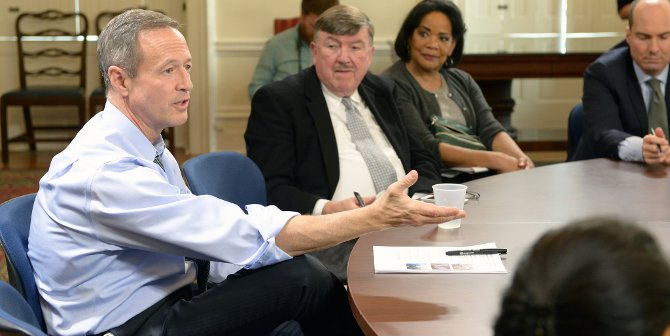USApp Managing Editor, Chris Gilson looks at the best in political blogging from around the Beltway. Our round-up of state blogs will follow on Saturday afternoon.
President Obama, the Democratic Party, and the GOP
While the latter part of the week was dominated by the White House’s reaction to the potential threat of the spread of the Ebola virus to people in the US, it began with more traditional partisan sniping. On Saturday, Crooks & Liars looks at the recurring idea that President Obama has failed to shut down the detention camp at Guantanamo Bay in Cuba. They say that while those on both sides of the aisle have blamed Obama for keeping the prison camp open, recent comments from Senator Pat Roberts (R-KS) show that the threat of a Congressional filibuster stalled the moving of prisoners to U.S. soil.
On Tuesday, The Daily Signal is critical of President Obama saying that while he has warned that the Republican Party will be committing political ‘suicide’ if they do not legalize millions of undocumented immigrants that currently live in the U.S., he has done little to address the persistent education achievement gap between Hispanics and non-Hispanic whites.
By Wednesday, concerns about the spread of Ebola caught up with the President, and he cancelled midterm campaign and fundraising events, reports White House Dossier. They say that it is good news and a smart move given two new infections in Dallas.

Moving on to the Republican Party, this week, PoliticusUSA looks at Senator Rand Paul (KY), who many believe has 2016 presidential ambitions. They say that Paul is ‘pandering’ to African American voters by promising prison reforms, changing drug laws and reforming voters’ rights, and that the ‘snake oil’ of trickle down economic policy that he also pushes is unlikely to do a great deal to help African American communities. The American Prospect is more supportive of Rand Paul this week. They say that win or lose, Paul’s aim is to recreate the Republican Party in his own image – one that would see the federal government dismantled and devolve far more power to the states. Hit & Run also looks ahead to 2016 this week, writing that the GOP’s ‘shadow primary’ has already begun. They say that several potential ‘establishment’ candidates including Jeb Bush, Chris Christie, and Mitt Romney have recently made comments that may indicate their desire to run.
American Thinker takes a more general look at the Republican Party, writing on Sunday that the party needs to be more inclusive, and move away from enforcing a ‘what would Ronald Reagan do’ style of ethos for its candidates. They say that the party’s Tea Party and ‘Republican in name only’ factionalism has too often resulted in losses for them.
The Midterm elections
With the midterm elections now only a few weeks away, election commentary from both sides of the ideological spectrum continued to grow. Turning to the Republican Party, on Monday, Hit & Run examines whether candidates from the Libertarian Party always pull votes from GOP candidates. They say that evidence from races in 2012 and 2013 show that this is very seldom the case, with Democrats often losing votes to Libertarian candidates. One thing that does hurt the Republican Party is their opposition to the minimum wage, at least according to Daily Kos this week. They write that Republican candidates for Governor who are against raising the minimum wage in states like Iowa, Illinois and Wisconsin, should be worried as voters are likely to hold this opposition against them.
While most commentators now believe that the Republican Party will retake the Senate after the midterm elections, there is little agreement as to by what margin. The Federalist writes on Thursday that if there is a GOP wave coming this fall, then it is ‘a mile wide and an inch deep’, as while they are forecast to gain eight seats, only five are currently leaning their way. There is a great deal riding on the Republican Party winning the Senate, writes Roll Call’s Rothenblog this week. They say that if the GOP fails to capture the Senate, then the 2016 presidential election could be an ‘unmitigated disaster’ for the party, as it will mean that observers are likely to conclude that the Democratic campaign has superior operatives, and that the Republican Party has little chance of winning back the White House.
Heading across the aisle, on Monday this week, PoliticusUSA reports that the Democratic Party made fundraising history in September with $16 million raised by the Democratic Senatorial Campaign Committee – half a million more than their GOP counterpart. This brings their total fundraising to more than $127 million for this election cycle. Fundraising success or not, the Democrats are beginning to worry about midterm turnout, writes Outside the Beltway. They say that polls in recent days have suggested low turnout on Election Day for the party’s liberal base, which will matter in the nine Senate races rated as ‘toss ups’ and the 14 similarly rated gubernatorial elections. On Thursday, The Atlantic writes that we should not count the Democrats out quite yet. They say that the reports of the party’s likely lousy Senate results have been months in the making, and that the recent commentary is simply the party reconciling with losses it has known were on the way.
FiveThirtyEight writes this week that current polling might be skewed towards either party, despite the fact that the Democrats have been complaining that they are biased towards the other side. No matter which party the polls favor this cycle, the national media are ‘falling in love’ with the Senate race in South Dakota this week, writes Daily Kos. They say that many major commentators such as The New York Times have noted that the seat, previously thought to be safe Republican, may now be in play because of the Independent candidacy of former Senator, Larry Pressler. Meanwhile, Roll Call’s At the Races looks at three potential endgame scenarios for the Senate – the GOP may have a near sweep with 53 seats, they may tie with runoffs, or the Democrats may just hold the Senate with 50 seats.
On Tuesday this week, the Monkey Cage writes that it is mostly quiet on the ‘House front’, saying that most forecasters give the GOP a 99 percent or better chance of holding on to the House, with between 235 and 249 seats. The Daily Signal, meanwhile, wonders where the household names of this campaign are. They say that compared to the 2010 campaign which saw one candidate declare that they were not a witch, and 2012’s Todd Akin who made gaffes with comments about rape, neither party has made waves. Meanwhile, Roll Call’s At the Races looks at the nine biggest candidate ‘flameouts’ of this cycle, from Sean Eldridge, a candidate in New York who was branded ‘$ean Eldridge’ by the GOP because he is the husband of a Facebook founder, to Republican Mead Treadwell, who lost his Alaska Senate primary due to poor fundraising, despite being viewed as an attractive candidate by the national Republican Party.
Government, the Beltway and Congress’ agenda
On Tuesday, The Atlantic looks ahead to how a Republican Congress might act if the GOP takes the Senate, as has been widely predicted. They say that previous GOP midterm wins in 1994 and 2010 resulted in the party overreaching, which has led to defeats in presidential elections. They say that the Republican Party can avoid repeating history by not trying to govern from Congress, not catering to donors, and by acting in specific ways to detoxify its image.
Daily Kos reports this week on comments from the Director of the National Institute of Health, Dr Francis Collins, on budget cuts and Ebola treatment. They say that Collins states that but for a decade’s worth of budget cuts worth 23 percent of the agency’s purchasing power, a vaccine for Ebola could have been developed.
Moving on to the Supreme Court, Wonkblog writes that it has allowed abortion clinics in Texas to remain open while a state law that would have effectively closed them is appealed. They say that the law would require physicians at abortion clinics to have admission privileges at a nearby hospital. Staying on the courts, The Daily Signal looks at why voter ID laws in a number of states are ‘tangled’ up in them. They say that legal fights in Texas, Wisconsin and Kansas are based on whether or not the laws may work to decrease turnout among certain groups – often minorities.
On Wednesday, Wonkblog writes that President Obama’s intended nominee to for a top slot in the Department of Justice, Vanita Gupta, is a ‘big deal’. They write that Gupta is an opponent of mandatory minimum sentencing laws, and significantly, has called for the legalization of marijuana by the states.
Foreign policy, defense and trade
On Saturday, Outside the Beltway writes that the U.S. air campaign against the forces of the Islamic State (IS) terror group in Iraq and Syria is not going well. They say that IS fighters are adapting to the airstrikes, and that U.S. allies on the ground would prefer them to attack the government in Damascus as well.
On Thursday, RedState uses Obama’s response to the threat of IS to illustrate their point that the President ‘cried wolf’. They say that Obama claimed that IS was a group of ‘amateurs’, but they are now overrunning Iraq, and that the Syrian rebels could not fight them – but they are now being armed by the U.S.
This week the Monkey Cage calls for the U.S. government to establish a ‘Council of International Strategy’. They say that a team of strategic analysts is needed who could model how different policies could reduce the probability or impact of an instability event that could threaten U.S. interests.
Obamacare and health policy
With fears growing over the potential spread of the Ebola virus, many this week called on President Obama to appoint an ‘Ebola czar’ to oversee efforts to fight the disease in West Africa and closer to home. The Federalist writes that there already is one in the form of Dr Nicole Lurie, who heads the Department of Health and Human Service’s office responsible for responding to threats to public health. They say that only the Obama administration knows why the top official for public health threats has been sidelined in the midst of the Ebola crisis. Meanwhile, Hit & Run looks at whether or not the Ebola outbreak can be blamed on GOP cuts to health budgets. They say that while some health spending has flattened out it has not been slashed, and the bureaucratic misallocation of resources may well be more important. With another case of Ebola in the U.S. coming to light late last week, The Daily Signal gives Obama an ‘F’ for the way that he has dealt with the crisis. They say that the government’s response to the latest case in Dallas leaves much to be desired, and that more action to reassure people and give them information on how the dangerous (or not) the virus can be is needed. Wonkblog has a look at the inevitable conspiracy theories around Ebola, including those that say that the virus is a way to control the population, or that it has been welcomed by Obama as ‘payback’ for slavery. On Friday the Obama administration appoints an ‘Ebola czar’ – Ron Klain. They are critical of the choice, writing that Klain has no medical background, and is a partisan staffer skilled at supporting the Democrats.

On November 15th, open enrollment into Obamacare’s exchanges will begin once again. The Daily Signal writes on Monday that the introduction of Obamacare has caused health costs to rise, with deductibles on the program’s exchanges coming in at over $2,000, compared to $1,000 for employer based coverage, on average. Meanwhile, The Atlantic warns that while those who already have coverage under Obamacare will be able to keep it – but they might be charged more. They say that the Obama administration will be encouraging existing customers to ‘shop around’ for coverage once again to avoid these potential price hikes.
The economy and society
On Saturday, The Atlantic looks at the wider context of recent judicial moves which have struck down same sex marriage bans as unconstitutional. They say that for at least one judge, such bans constitute sex discrimination, and that is one way that the Supreme Court might eventually be able to strike down all same sex marriage bans.
On Sunday, Outside the Beltway looks at a new and sobering study that finds that young African American men are 21 times more likely to be shot dead by police than their white counterparts. They say that this statistic will reinforce the belief among many African Americans that they are disproportionately targeted by the police. Still on the issue of racial inequalities, Hit & Run writes that a recent poll has found that 59 percent of Democrats say that the criminal justice system treats white Americans more fairly than minorities, and that 62 percent of Republicans say the system treats all equally.
Recent weeks have seen more positive news about the state of the economy – and yet many people are unable to feel the benefits, writes The Atlantic. They say despite unemployment falling to below 6 percent for the first time since 2008, people are still dropping out of the labor force, and wages have largely stagnated. On Wednesday, Crooks & Liars writes on a new study that has found that those states that have more active anti-union policies actually end up paying more in public funds to subsidise low income workers. They say that states which have such ‘right to work’ laws have reduced worker income by over three percent, and have fewer workers covered by health insurance and pension plans.
And finally…
Florida’s SaintPetersblog looksat how this week an electic fan nearly derailed the state’s gubernatorial debate after the GOP candidate, Rick Scott, refused to take to the stage because of the presence of the offending item. They say that Scott finally deigned to participate after ten minutes.
Think that presidential speeches have been dumbed down? You’d be right. The Atlantic writes that in the 1850s, presidential speeches had a college level of rhetoric. Now they languish at around a 6th grade level.
Roll Call’s Heard on the Hill looks at a new Tumblr phenomenon – Dogs Impersonating Vice President Joe Biden.
Featured image credit: MudflapDC (CC- BY-NC-SA-2.0)
Please read our comments policy before commenting.
Note: This article gives the views of the author, and not the position of USApp– American Politics and Policy, nor of the London School of Economics.
Shortened URL for this post: http://bit.ly/1oeygr3






